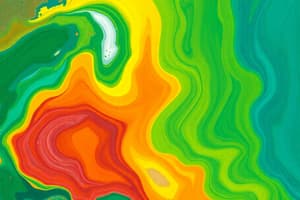Podcast
Questions and Answers
What is the purpose of a Classification System?
What is the purpose of a Classification System?
- To create detailed geographic maps
- To organize, generalize, & simplify information (correct)
- To project future climate patterns
- To analyze historical climatic data
What are the three climate zones in the Greek Climate System?
What are the three climate zones in the Greek Climate System?
torrid, frigid, temperate
Name one of the climate controls.
Name one of the climate controls.
latitude
What does the Köppen System - A indicate?
What does the Köppen System - A indicate?
What characterizes Köppen System - B?
What characterizes Köppen System - B?
What does Köppen System - C imply about climate?
What does Köppen System - C imply about climate?
What are the conditions of Köppen System - D?
What are the conditions of Köppen System - D?
Describe Köppen System - E.
Describe Köppen System - E.
What does Köppen System - H represent?
What does Köppen System - H represent?
The Köppen System's 2nd letter indicates the __________ pattern.
The Köppen System's 2nd letter indicates the __________ pattern.
What does the 3rd letter in the Köppen System signify?
What does the 3rd letter in the Köppen System signify?
What is an Af climate?
What is an Af climate?
What does Aw stand for in the Köppen classification?
What does Aw stand for in the Köppen classification?
What is the defining feature of an Am climate?
What is the defining feature of an Am climate?
What does BW signify?
What does BW signify?
What climate does BS represent?
What climate does BS represent?
Define Cfa climate.
Define Cfa climate.
What does Cs stand for in the Köppen system?
What does Cs stand for in the Köppen system?
What characterizes Cfb climate?
What characterizes Cfb climate?
Describe the Dfa, Dfb climate.
Describe the Dfa, Dfb climate.
What is the characteristic of Dfc climate?
What is the characteristic of Dfc climate?
Define ET climate.
Define ET climate.
What does EF represent?
What does EF represent?
What does vegetation express?
What does vegetation express?
How does animal life adapt?
How does animal life adapt?
What do soils develop in response to?
What do soils develop in response to?
What is an Environmental Complex/Ecosystem?
What is an Environmental Complex/Ecosystem?
What does climatology study?
What does climatology study?
What is the purpose of the Koppen Classification System?
What is the purpose of the Koppen Classification System?
What does the Thornthwaite Classification System focus on?
What does the Thornthwaite Classification System focus on?
Flashcards are hidden until you start studying
Study Notes
Classification Systems
- Purpose of a classification system is to organize, generalize, and simplify data for better understanding.
Greek Climate Zones
- Identifies three climate zones:
- Torrid: equatorial regions
- Frigid: polar regions
- Temperate: mid-latitude regions
Climate Controls
- Factors influencing climate include:
- Latitude
- Altitude
- Land/water distribution
- Ocean currents
- Atmospheric circulation (winds)
- Topographic barriers (mountain ranges)
Köppen Climate Classification - Category A
- Represents tropical climates with:
- No winter; warm year-round
- Every month averages above 64.4 °F
Köppen Climate Classification - Category B
- Describes dry/arid climates where:
- Evaporation exceeds precipitation
Köppen Climate Classification - Category C
- Characterizes warm temperate climates with:
- Mild winters; coldest month below 64.4 °F but above 26.6 °F
Köppen Climate Classification - Category D
- Defines cool/cold temperate climates with:
- Cold winters; coldest month below 26.6 °F and warmest month above 50 °F
Köppen Climate Classification - Category E
- Identifies polar climates where:
- Always cold; warmest month below 50 °F
Köppen Climate Classification - Category H
- Refers to highland climates that feature:
- Significant temperature and precipitation variations over small distances due to mountainous terrain
Köppen System - Second Letter
- Indicates precipitation patterns:
- f: no dry season
- w: winter dry season
- s: summer dry season
- m: winter dry with monsoon-heavy summer rainfall
Köppen System - Third Letter
- Provides precision on temperature specifics:
- a: hot summers
- b: warm summers
- c: cool summers
- d: very cold winters
Specific Climate Types in Köppen Classification
- Af - Tropical Rain Forest: Equatorial location, warm year-round, no dry season.
- Aw - Tropical Savanna: Adjacent to rainforests, warm year-round, dry winter.
- Am - Tropical Monsoon: Southeast Asia location, dry winter, very wet summer.
- BW - True Desert: Located at 20-30° latitude, variable temperatures, evaporation exceeds precipitation.
- BS - Steppe: Transitional region between arid and humid climates, variable temperatures, evaporation exceeds precipitation.
- Cfa - Humid Subtropical: Found in southeastern continents, warm/hot summers, no dry season.
- Cs - Mediterranean: Approximately 35° latitude, warm summers, mild winters, dry summer.
- Cfb - Marine West Coast: Located poleward of Mediterranean climates, mild year-round, no dry season.
- Dfa/Dfb - Humid Continental: Central/eastern continents (above 35-40° latitude), warm summers, cold winters, no dry season.
- Dfc - Subarctic: Found between 50-70° latitude, mild summers, very cold winters, no dry season.
- ET - Tundra: Near Arctic Ocean, cold temperatures, warmest month above freezing.
- EF - Ice Cap: Found in Antarctica and Greenland, consistently cold temperatures below freezing.
Ecological Elements
- Vegetation: Signifies the most visible expression of climate.
- Animal Life: Adapts based on climate and vegetation types.
- Soils: Develop in response to climate and vegetation.
- Environmental Complex/Ecosystem: Interactions among climate, vegetation, animal life, soils, and landforms.
Climatology
- Focuses on the evolution of climate regions based on moisture and temperature conditions.
Köppen Classification System
- Widely utilized climate classification map, relying on 30 years of climate statistics, emphasizing vegetation, defined by mean monthly precipitation and temperatures.
Thornthwaite Classification System
- Focuses on water balance rather than just temperature and precipitation, relies on modified potential evapotranspiration (PET), categorizing regions from humid to arid based on their water budget.
Studying That Suits You
Use AI to generate personalized quizzes and flashcards to suit your learning preferences.




